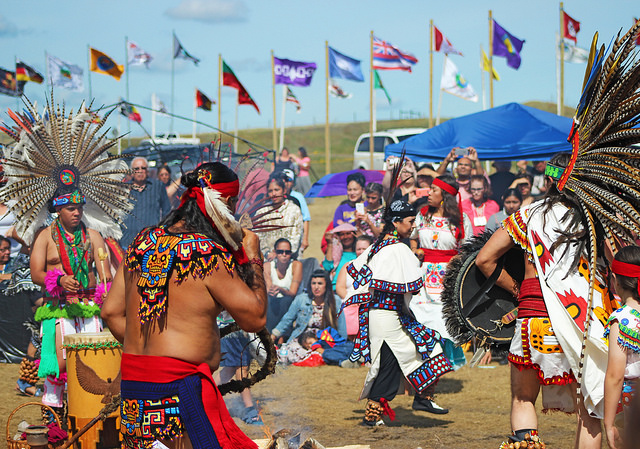By John W. Coleman
Thousands of people, including members of over 250 Native American tribes, have gathered at a camp site near Cannon Ball, N.D., to join the growing protest against plans to install a pipeline that would carry crude oil through Standing Rock Sioux sacred land and possibly threaten their water safety. Hundreds more are gathering in cities across the nation, including here in Philadelphia.
The Philadelphia Solidarity March for Standing Rock will kick off Saturday, Sept.17, at 1 PM, at City Hall (15th and Market Streets), and some Eastern PA Conference members plan to attend. The nonviolent march is in response to calls for solidarity with Native American land defenders on the Standing Rock Sioux Reservation in North Dakota.
Two firms operating in the Philadelphia area—Sunoco Logistics Partners and TD Bank—are reportedly involved in construction of the nearly 1,200-mile long Dakota Access Pipeline (DAPL) beneath the Missouri River that would stretch across a portion of the tribe’s land. Another rally will take place on Wednesday, Sept. 21, at 11 AM, beginning at 3930 West Chester Pike in Newtown Square, near Sunoco Logistics Partners’ offices.
Costing $3.8 billion, the pipeline would transport nearly 570,000 barrels of oil into Illinois daily. Some fear it could pollute drinking water for the tribe and other residents downstream, a concern that admittedly caused the Army Corps of Engineers to shift the route of the Dakota Access Pipeline away from Bismarck to less populated land.Last week DAPL crews bulldozed through recently identified burial grounds and sacred sites, deploying attack dogs when confronted by protesters. Online video of the altercation stoked support for the protesters and inspired new arrivals at the protest site.
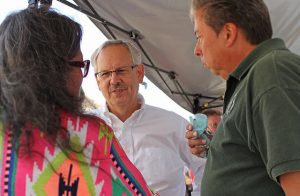
Bishop Bruce R. Ough and Rev. David Wilson speaking with Phyllis Young, member and former council woman of the Standing Rock nation at Oceti Sakowin Camp, near Cannon Ball, ND.
Dakotas-Minnesota Area Bishop Bruce R. Ough issued a statement supporting the protesters and the tribe, while some UM clergy across North and South Dakota joined him in advocating for justice.
The United Methodist Board of Church and Society announced that it too stands in solidarity with the peaceful protesters and advocates that national leaders listen to communities affected by the pipeline. The Rev. Susan Henry Crowe, General Secretary, and Bishop Ough both joined protesters at the camp site last week to learn more and offer support.
“The United Methodist Church, through the statements and actions of General Conference, has continually affirmed the importance of protecting creation and the importance of building bridges of respect and understanding with indigenous persons,” asserted the board. “Confronted with the ongoing marginalization and oppression of native peoples, we must pair our acts of repentance and healing with acts of solidarity and justice.”
Bishop Peggy Johnson expressed that same sentiment at the Eastern PA Annual Conference in June when she and Conference Lay Leader David Koch led members in a “Responsive Confession” during the Act of Repentance ceremony. They included a list of commitments offered on behalf of the conference. Among them was one supporting “United Methodist justice initiatives for Native peoples related to land and treaty rights, cultural preservation, health and education.”
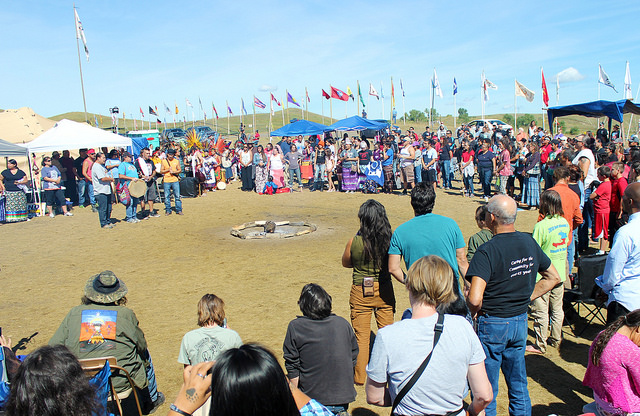
Presentation of the flags at the main circle of the Oceti Sakowin Camp, near Cannon Ball, ND.
Growing support for protest brings a reprieve
The Oklahoma Indian Missionary Conference (OIMC) has provided food, gasoline for generators, large canopy tents and other supplies to the swelling protest camp, which ranges up to 2,000 people. Standing Rock Sioux tribal leaders are trying to provide three meals a day for those coming to support their cause.
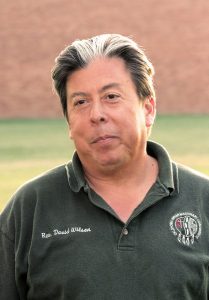
Rev. David Wilson at the United Tribes Pow Wow in BIsmarck, ND. Oklahoma Indian Missionary Conference of the United Methodist Church. Sept. 10, 2016.
“The reservation is already facing catastrophic numbers of social ills, and now they have to deal with the water being polluted and people taking advantage of what they have,” said the Rev. David Wilson, OIMC Superintendent. “That angers and saddens me.”
He recalled visiting the reservation in 2011, when there was a rash of 29 suicides in one month by young people. Wilson said this struggle is similar to the story of David and Goliath. “They have taken so much from this tribe in terms of land, and now they want to take away probably the most precious resource, which is water.”
Last week a federal judge ruled against the tribe’s request for a preliminary injunction against the Army Corps of Engineers to stop pipeline construction while a federal lawsuit filed by the tribe is heard. The lawsuit contends the construction and operation of the pipeline threatens its environmental and economic well-being and would damage or destroy sites that have great historical, religious and cultural significance to the tribe. The lawsuit said the pipeline violates the National Historic Preservation Act and the Clean Water Act, among other laws.
However, immediately after the judge’s disappointing decision, three federal agencies surprised everyone by stepping in to suspend construction of a portion of the pipeline near Lake Oahe. The Justice and Interior departments and the Army Corps acknowledged the “important issues raised by the Standing Rock Sioux Tribe and other tribal nations … regarding the Dakota Access pipeline specifically, and pipeline-related decision-making generally.”
The agencies called for a “serious discussion” with tribal governments about “whether there should be nationwide reform with respect to considering tribes’ views on these types of infrastructure projects.”
Church committed to justice for Native peoples
Bishop Ough said in his statement of support for the Lakota and Dakota people that the protest “is informed by the memory of broken treaties and disingenuous promises…. Ultimately, this is a protest about the stewardship of God’s creation and justice for the indigenous peoples of the Great Plains. Ultimately, this is a spiritual battle,” Ough said.
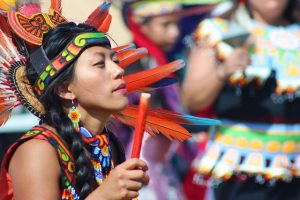
Aztec dancers at Oceti Sakowin Camp, near Cannon Ball, N.
Caring for stewardship and justice inspired one white United Methodist couple from Kansas—an environmentalist and a retired biologist—to drive 13 hours to join the protests after reading an article about the fight, which they contend is not just a Native issue.
“All these years, I’ve been sensitive to how we treated Native Americans historically, and this issue struck a chord with me,” Lynne Hunter said. “They’ve had no power and have been used in the past,” added her husband, Charles Hunter. “Now, they are showing a lot of power as a larger Indian nation, and they need our support. They could just have easily put this pipeline under the river at Bismarck. Well, guess what? That’s where the white people live.”
Both Wilson and Ough point to The United Methodist Church’s Social Principles, which call on all United Methodists to seek environmental justice and “to approach creation, energy production, and especially creation’s resources in a responsible, careful, and economic way.” (2012 Book of Discipline, p.106).
The Rev. Anita Phillips, Director of the church’s Native American Comprehensive Plan, says the pipeline issue gives United Methodists a unique opportunity to fulfill promises made by the 2012 General Conference during the Act of Repentance to Indigenous Peoples. The Act of Repentance service acknowledged wrongdoing to indigenous peoples and began a journey of healing.
“This is a place where the church and the reality of life for Native American people are meeting,” said Phillips. “This is not just a physical place where we are talking about oil; it’s not just a racial justice issue; this is a time for us to claim our identity as disciples of Jesus Christ.”
JOINING THE EFFORT
Creating awareness and advocating on behalf of the Standing Rock Sioux Tribe are just a few ways to get involved. Monetary donations can be made directly to the tribe or through the Oklahoma Indian Missionary Conference.
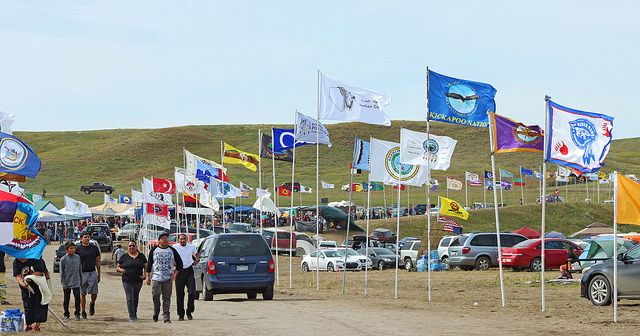
Photos by Dave Stucke, Dakotas UMC.
SOURCES
This article was adapted from several sources, including:
- “United Methodists, Native Americans oppose pipeline” by freelance writer Ginny Underwood, published by UMNS,
- The Philadelphia Solidarity March for Standing Rock Facebook page, and
- “The Standing Rock Sioux Have Been Heard. Now What?” by Zoë Carpenter, published by The Nation.
For more United Methodist coverage See “United Methodists stand with Standing Rock” (Sept. 12) by Doreen Gosmire, Dakotas Conference Director of Communications. And view a related Dakotas UMC video from the scene.

